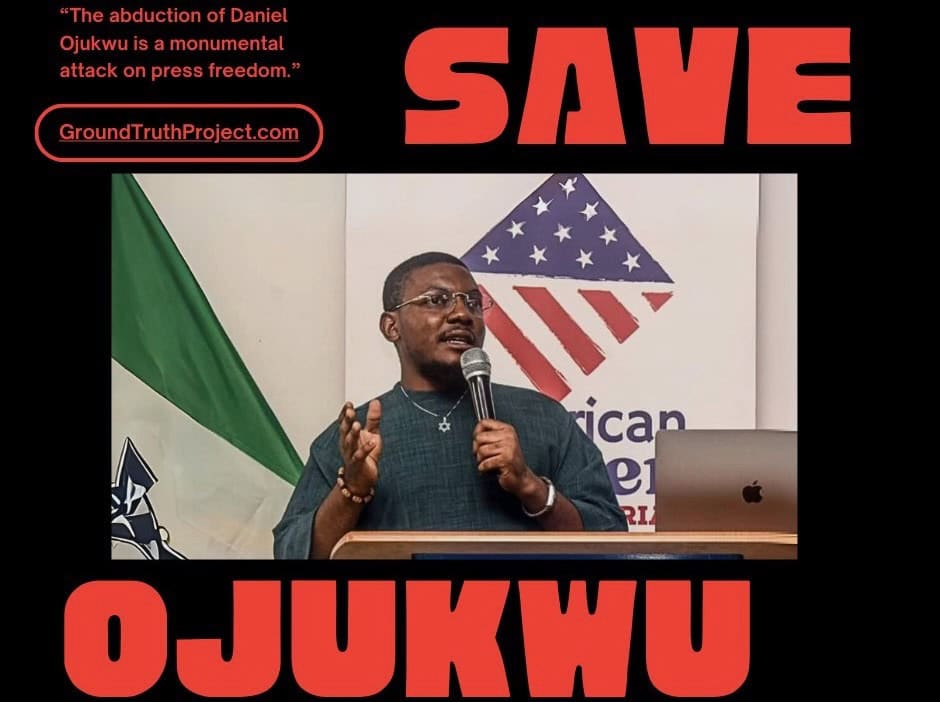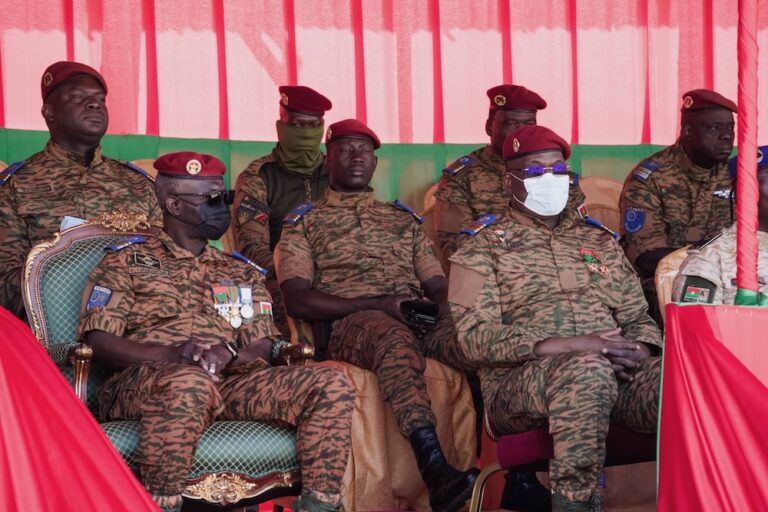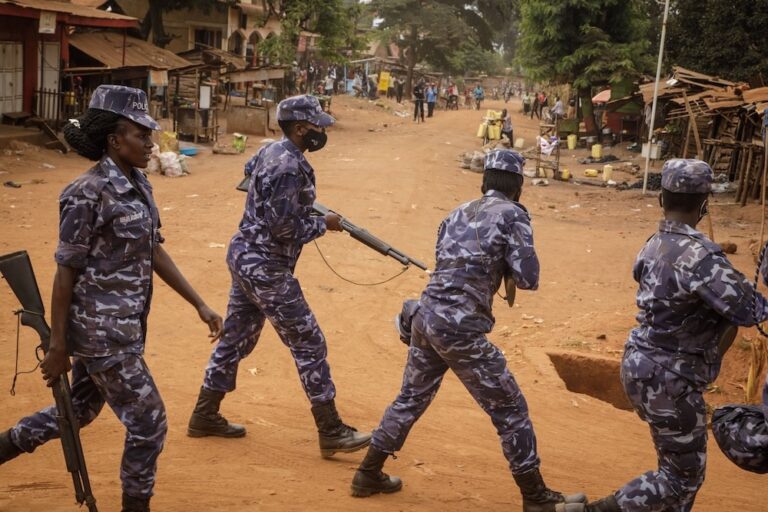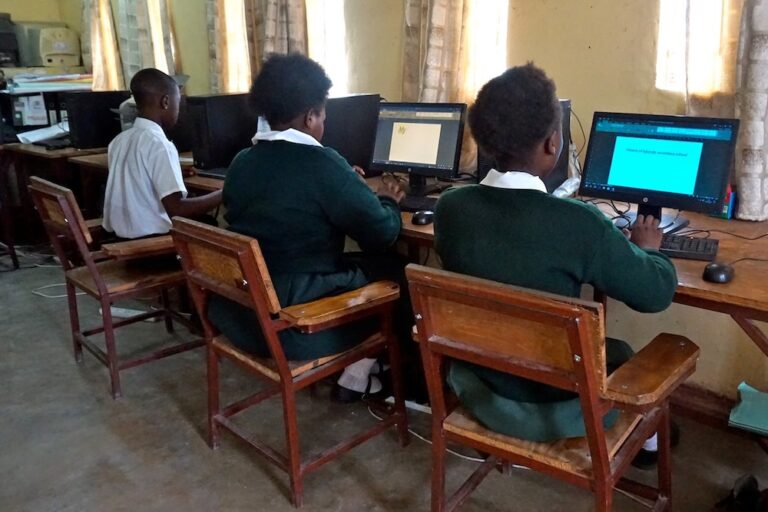May 2024 in Africa: A free expression and civic space round-up produced by IFEX’s Regional Editor Reyhana Masters, based on IFEX member reports and news from the region.
The series of violations in the prelude to World Press Freedom Day 2024 (#WPFD2024) commemorations and the period after speaks to the continuing deterioration of the media landscape across the continent.
This is particularly felt during election periods, as confirmed by Reporters Without Borders in their analysis of world press freedom rankings for 2023. “Elections in sub-Saharan Africa resulted in a great deal of violence against journalists and the media by political actors and their supporters. During elections, politicians also tried to use the media as instruments for exercising influence and imposing authority.”
Nigeria: Abuses of power and ‘guns for hire’
The most striking instance of the continuing abuse of power by those in authority was the arrest and detention of Nigerian investigative journalist Daniel Ojukwu on 1 May – ironically the month of press freedom commemorations.
Whilst the police charged him for violating Nigeria’s Cybercrimes Act, Ojukwu’s arrest came after he published a story exposing the misappropriation of funds by the office of the senior special assistant to the Nigerian president.
Although authorities insisted his arrest was lawful, the reporter was forcibly snatched off a street in Lagos and detained incommunicado until members of his family and colleagues from the Foundation for Investigative Journalism (FIJ) managed to track him down. Authorities admitted they had him in custody but immediately flew him to Abuja. RSF reports how the police refused to release him, even though he satisfied all the bail conditions. His rights were further violated when he was prevented from consulting his doctor or getting the medicine he needed for asthma.
The series of serious infractions in this case prompted colleagues from the media fraternity and civil society organisations to take to the streets and demand his release under the #FreeDanielOjukwu campaign. He was eventually released on 10 May.
Instead of these infringements abating, just a few weeks later Media Rights Agenda reported that at “6:00 pm on May 22, 2024, 10 heavily armed policemen reportedly stormed Mr [Madu] Onuorah’s home in Lugbe area of Abuja in two Sienna buses and in the presence of his wife and children, forcibly arrested and took him away without presenting any warrant of arrest or disclosing any reason for his arrest.”
The publisher and editor-in-chief of the independent online news outlet Global Upfront was arrested after the police received a petition from a United States-based Reverend Sister of the University Sisters of Assumptions Congregation, alleging she had been defamed.
In their condemnation of the manner in which Onuorah was arrested, the MRA described the Nigerian police as becoming “a gun for hire at the disposal of rich or powerful individuals or organizations who wish to silence journalists or to punish them for critical reporting . . . ”
Two days prior to this incident, journalist Nurudeen Akewushola and his colleague from the International Centre for Investigative Reporting (ICIR), executive director Dayo Aiyetan, were held for over nine hours by the national cybercrime centre. The two were questioned over a report published in February this year alleging the involvement of two former police inspector generals of police – Solomon Ehigiator Arase and Ibrahim Kpotum Idris – in illegal land sales.
Nigerian CSOs adopt media freedom plan of action
Concern over the spiral of repression under which Nigerian media are operating has consistently been raised by IFEX members. This has now translated into the adoption of the Lagos Plan of Action on Media Freedom in Nigeria, following a meeting convened by MRA and Global Rights: Advocates for Sustainable Justice, in collaboration with the International Press Centre (IPC) and the Centre for Media and Society (CEMESO). The plan talks of improving military and law enforcement officials’ comprehension of the media’s essential role and journalists’ rights. It also recommends integrating this knowledge into official training curricula to positively influence their attitudes and actions.
Mali sidesteps commitment
The worsening situation has been equally visible in West Africa – namely in Mali, which ignored its commitment to ending transitional rule in March and instead organised a national dialogue on 10 May during which a recommendation was made to extend the military-led transition to democracy by three years. Opposition Malian parties and civil society organisations rejected the proposals and denounced the process, which was organised by the junta, as a “sham”, according to a TRTAfrika report.
As the Media Foundation for West Africa observed: “the government has not only conveniently forgotten their transitional calendar and it commitments . . . they also have actually taken a series of anti-democratic measures in the past few months that suggest an attempt at consolidating their grip on power. The authorities have continued where they had left off in 2023, with a massive crackdown on opposition groups and critical voices.”
One of the critical voices being smothered is that of prominent economist and professor Dr Etienne Fakaba Sissoko, who has paid a hefty price for his book “Propaganda, Agitation and Harassment – government communication during the transition in Mali”. Convicted for defamation and damaging the state’s reputation by distributing “fake news”, Dr Sissoko was fined the equivalent of US$4,900 and handed a two-year prison sentence, one year of which was suspended.
“Sissoko’s arrest on March 25 followed closely on the heels of a similar crackdown on a senior army officer, Colonel Alpha Yaya Sangaré. The officer was arrested on March 2, 2024, after he authored a book highlighting the armed forces’ abuses against civilians in their anti-insurgency campaign,” reports MFWA.
Grip on power tightens in Burkina Faso
Following in what seems to be a template move, Burkina Faso’s military government announced it would extend junta rule for an “additional 60-month transition period, which will take effect from 2 July this year.” This announcement in May was made just two months before the country’s transition period was set to end.
The decision was taken during a national dialogue process held in the country’s capital city, Ouagadougou, on 25 May. The newly amended Transition Charter includes additional new provisions. As the Jurist reports: “Captain Traoré now holds the titles of President of Faso, Head of State, and Supreme Commander of the Armed Forces. Additionally, Traoré, along with the Prime Minister and the President of the Transitional Legislative Assembly, will be eligible to run in the presidential, legislative, and municipal elections organized to mark the end of the transition period.”
In the run-up to this national convention, authorities had already been paving the way to silence critical voices.
Towards the end of April, Burkina Faso’s media regulator, the Conseil supérieur de la communication (CSC), suspended TV5 Monde’s international programmes from being aired in the country for two weeks. This action was taken alongside the blocking of access to numerous foreign news websites, which included Deutsche Welle, Ouest-France, Le Monde.fr, ApaNews, The Guardian, and AgenceEcofin. This was in response to the affected media outlets’ coverage of a recent report by Human Rights Watch, which accuses the Burkinabe army of a series of abusive attacks against civilians in the north and north-east of the country.
Earlier in the month, Newton Ahmed Barry, journalist and former president of the Independent National Electoral Commission (CENI), was given a two-month suspended prison sentence and fined in absentia.
Manipulation of narratives in South African elections
The South African elections held on 29 May concluded with a major setback for the African National Congress, which lost its majority in parliament. As political players navigate their way through this post-election scenario, it will be crucial to understand how online disinformation and misinformation pathways were used to pollute the information ecosystem.
As highlighted in a report by IFEX member the Collaboration on International ICT Policy for East and Southern Africa (CIPESA), the peddling of polluted information centred around topical issues consuming the attention of citizens, including: “growing poverty and economic inequality, unemployment, violent crime, corruption, service delivery failures, difficult race relations, and xenophobia”.
A prevailing feature of this highly contested election was the use of Generative Artificial Intelligence to produce deepfake videos and manipulated images, and the commodification of influence. An investigation by South African publication Daily Maverick has mapped out this ‘complex ecosystem’.
“The capacity of influencers to manipulate social media trends presents a significant concern as they are able to reference current topics or employ widespread hashtags to weave their messages into wider dialogues, frequently in ways that are irrelevant or deceptive.”
As the Daily Maverick goes on to explain:
“Mega influencers with more than a million followers are not just digital entities but individuals with significant sway over their audiences. Their endorsements and opinions can shape perceptions and decisions, influencing everything from consumer behaviour to voting patterns.”
Threats to journalists, access to information, and the climate crisis referenced in IFEX member #WPFD commemorations
Escalating threats against journalists was a common theme running through the #WPFD2024 statements.
The Media Institute of Southern Africa noted that while “improvements were recorded in Tanzania, Malawi, Eswatini, Zimbabwe, and Angola, . . . press freedom in Southern Africa has significantly declined in the past year.” While pointing out how cybercrime legislation legitimises unwarranted surveillance, MISA asked “why countries like Zambia and Namibia, which took bold decisions and enacted access to information laws, are on the decline, and Mauritania eclipses Namibia.”
This query comes as Mauritania climbed up the ranks to 33rd position in the global rankings, placing it at the top of the list of African countries.
At the regional WPFD event hosted jointly with UNESCO, during which MISA launched its Southern Africa Press Freedom Report for 2023, Botswana President Mokgweetsi Masisi highlighted challenges facing the media in the region, including financial sustainability and the spread of misinformation and disinformation, while emphasising the urgent need for thoughtful reflection and the development of effective solutions.
Drawing on this year’s theme, the MFWA highlighted how the “alarming effects of the climate change crisis in the region have been exacerbated by a growing restriction of the civic space that impedes the work of journalists and activists working to help save the environment.” The MFWA also hosted a national public forum in Guinea Bissau “to bring together key stakeholders – state and non-state actors – to reflect and deliberate on the state of press freedom and freedom of expression.”
Also focusing on the global environmental crisis, the Gambia Press Union called on “governments to create an atmosphere for independent journalism, free of harassment, intimidation, and violence against it.”
The Ugandan chapter of Human Rights Network for Journalists emphasised how “journalists are pivotal in informing society, yet their ability to report on environmental issues is hindered by powerful individuals and state entities, making it a dangerous endeavor. Shockingly, since 2020, 12 journalists have been arbitrarily arrested while covering environmental degradation, impeding their crucial role in raising awareness.”



